Can the Abraham Accords Succeed? Exploring Arab Support for Normalization with Israel
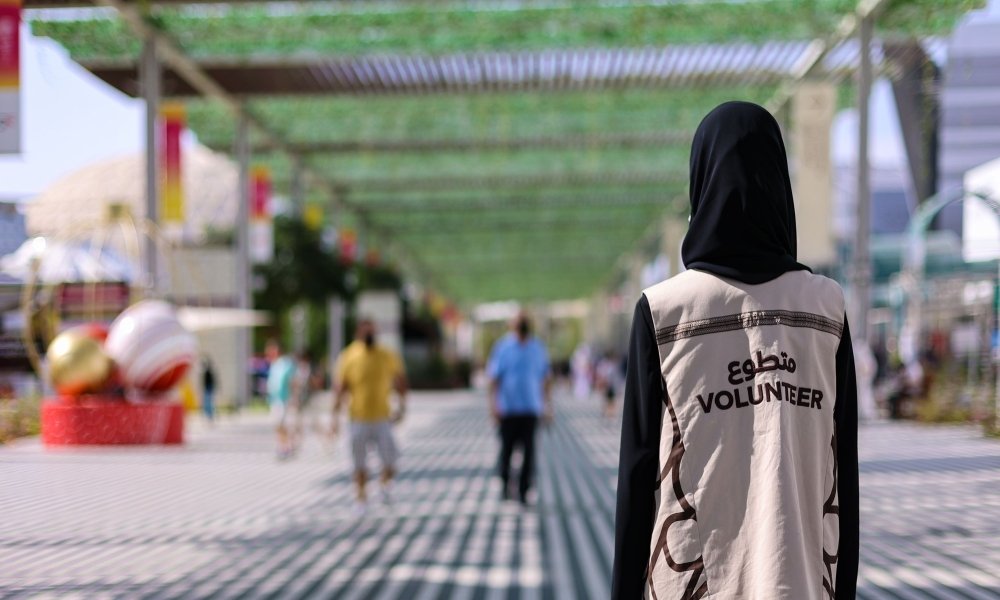
Asifgraphy / shutterstock.com
In August 2020, the United Arab Emirates, Bahrain, and Israel signed the landmark Abraham Accords and agreed to cooperate in fields ranging from economics to security and healthcare. Afterward, Sudan and Morocco also signed peace treaties, joining Egypt (since 1979), Jordan (since 1994), and Mauritania (since 1999) in officially recognizing the Jewish state.
The Abraham Accords are a significant step in Middle East peacemaking. Yet after decades of conflict and the lack of an independent Palestinian state that is recognized by Israel, public opinion in Arab countries remains staunchly opposed to the recognition of Israel. Polls conducted in 2019-2020 by the Arab Opinion Index in Kuwait found that fewer than 10 percent of the citizens of Saudi Arabia, Kuwait, and Qatar would support their country’s diplomatic recognition of Israel. The Palestinian Center for Policy and Survey Research (PSR) found that 86 percent of Palestinians believe that the Abraham Accords benefit only Israel.
These sentiments are not without their reasons. As with the previous Egyptian and Jordanian peace agreements, the Accords contain no provisions to help the Palestinians reach a final status agreement with Israel to advance a two-state solution. After decades of conflict and in light of the underlying context, Arab citizens have good reason to oppose the agreement. Yet in order for the Abraham Accords to be successful in peacebuilding, they should be supported by Arab and Israeli publics. To explore this, I looked at polling data to understand the factors that shape Arab people’s willingness to hold conciliatory views toward Israel.
Arab Support for Normalization
In an article I recently published in Mediterranean Politics, I drew on data from the 2012-2014 Arab Barometer surveys, the most recent wave of the Barometer to include extensive questions on the topic. In it, I developed and tested a social capital theory of peacebuilding that helps guide my analysis of policy-relevant ways to build on the gains of the Abraham Accords. This theory holds that when citizens feel more secure and are more engaged in civil society organizations, trusting of and tolerant toward others, and globally connected, they will be more likely to support peacebuilding.
Here I will briefly highlight three findings that relate directly to US international development and security assistance programs in the region. First, I find that social capital in the form of civil society organization membership, interpersonal trust and tolerance (controlling for other factors such as age and gender), is positively related to willingness to accept Israel. This supports international development programs that support associational life in the region. Second, I find that social media usage is related to a higher likelihood of holding conciliatory views, suggesting the value of improving global connectivity, especially among those groups most likely to be excluded by the digital divide. Finally—and crucially—I find that perceived physical insecurity undermines willingness to accept normalization with Israel, suggesting the urgency with which the region’s lack of security must be addressed for peace and human flourishing to be possible.
In the twelve countries in the survey, only 20.4 percent of respondents believe that the Arab world should accept Israel, while 79.6 percent believe it should not.
To do this research, I used a variable from the Arab Barometer measuring support for normalization with Israel as the dependent variable:
In the twelve countries in the survey, only 20.4 percent of respondents believe that the Arab world should accept Israel, while 79.6 percent believe it should not. The proportion who would accept Israel is highest in Lebanon (30.7 percent), Sudan (28.3 percent), and Kuwait (26.1 percent), and lowest in Libya (11.6 percent), Algeria (11.4 percent), and Iraq (10.4 percent). However, as shown, it never exceeds 30.7 percent, and that is in Lebanon, which is a country with its own complex history with Israel and a high proportion of Christians who, on the whole, hold more conciliatory views toward Israel than Sunni Muslims in the sample.
Figure 1. Proportion who supports accepting Israel (Dependent variable)
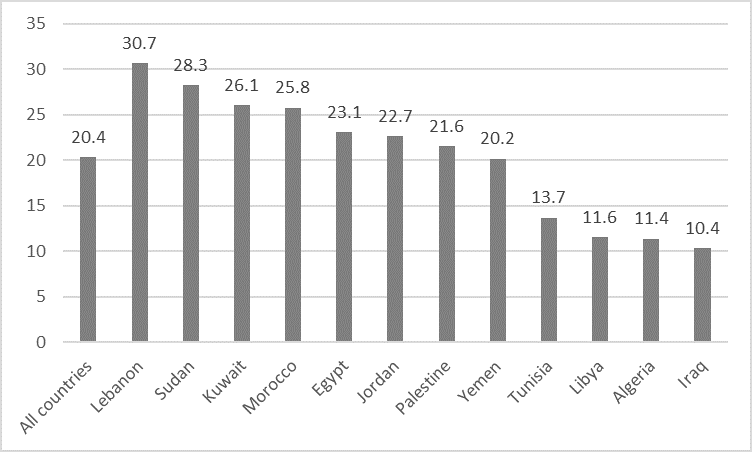
Lindsay J. Benstead
Civil society and support for peacebuilding
In my analysis, I used regression analysis to test a social capital of peacebuilding. Robert Putnam defines social capital as “connections among individuals – social networks and the norms of reciprocity and trustworthiness that arise from them” (p. 19)—the glue that makes societies, economies, and political systems function well. Theoretically, social capital develops when citizens engage in different types of civil society organizations, which could include clubs, associations, and religious organizations. When they do, citizens develop interpersonal trust and tolerance, and this supports democratic political engagement. Insecurity is a threat to social capital formation because it breeds distrust, lack of tolerance, suspicion of democracy, and, I argue, lack of support for normalization.
Civil society organizations are abundant in the Arab world. Although they are often coopted and undermined by authoritarian regimes, civil society organizations are also a major focus of US aid for democracy promotion. In my analysis, I find a small but statistically significant relationship between belonging to an association and being more supportive of normalization with Israel.
Not every civil society organization will support normalization—and some oppose it—but the data suggest that overall, civil society organizations foster the type of social capital that is positive for peacebuilding.
The survey question includes many types of associations with different aims such trade unions, cultural and sports organizations, tribal associations, and others, which may explain the small size of the effect. Not every civil society organization will support normalization—and some oppose it—but the data suggest that overall, civil society organizations foster the type of social capital that is positive for peacebuilding. Civil society can also, under some conditions, foster interpersonal trust. As shown in Figure 5, for example, the probability of being willing to recognize Israel increases from 11.3 percent among those with no trust to 13.4 percent among those who have trust.
Figure 2. Predicted probability of willingness to recognize Israel at levels of interpersonal trust
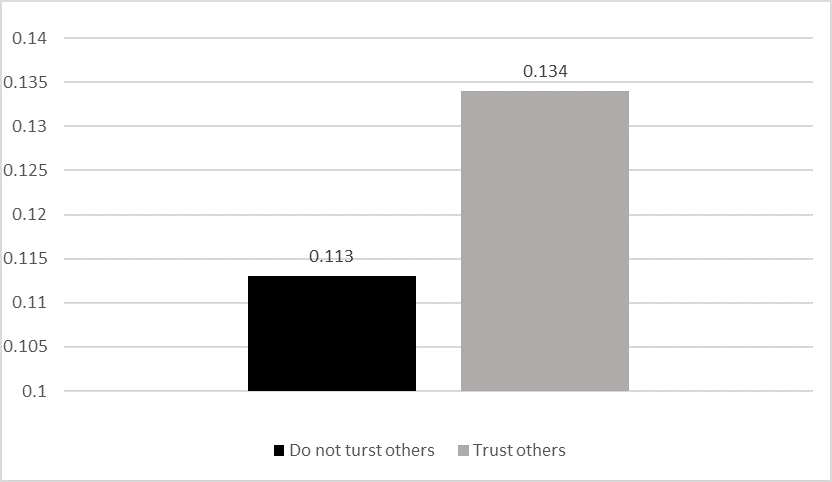
Lindsay J. Benstead
The size of the effect is larger for tolerance, another outcome of civil society engagement. As shown in Figure 4, the probability that a respondent will state their willingness to accept Israel increases from 8.7 percent among those who believe diversity is very bad to 12.4 percent among those who believe it is very good.
This suggests that international development programs that support civil society—a key pillar of the work that USAID, MEPI, and other US-based organizations already do in the region—can be an important part of strengthening social capital and creating the conditions for fostering conciliatory views in the Arab world toward Israel.
Figure 3. Predicted probability of willingness to recognize Israel at low to high levels of tolerance
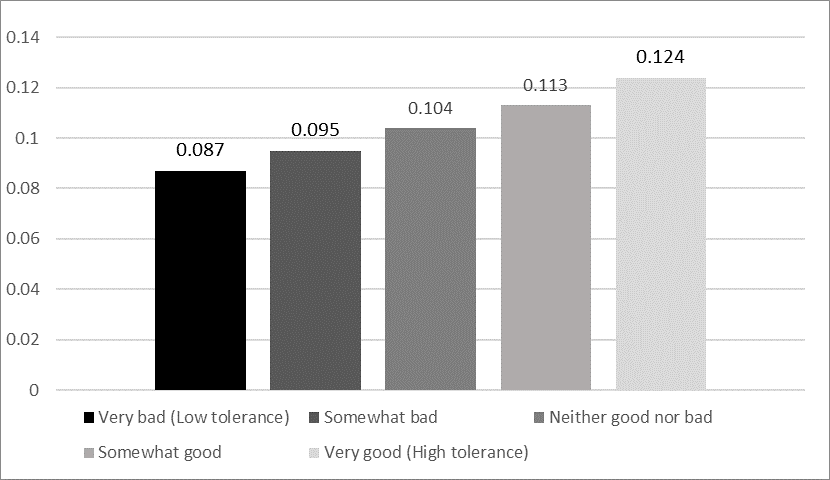
Lindsay J. Benstead
Social media use fosters support
Further, with the expansion of the Internet and social media, scholars working in different world regions have asked whether online interactions function in much the same way as civil society organizations to produce interpersonal trust, tolerance, and other conditions that are more fertile for peacebuilding.
Internet usage is high in the MENA region—reaching as high as 100 percent in some Gulf countries— but the region has a stark digital divide. According to the Arab Barometer, women, the elderly, the less educated, and lower income individuals are much less likely to be digitally connected than men, more educated, and more affluent citizens. Social media has particular potential in the Arab world as a way to connect citizens with members of their own society and beyond.
Among those who do not use social media, the likelihood of being willing to accept Israel is 11.3 percent, compared to 15.9 percent among those who use five forms of social media.
Arab Barometer data bears out this more sanguine view of the digital transformation unfolding in the region. Social media usage is positively related to support for normalization, suggesting that engaging on platforms like Facebook and Twitter promotes rather than undermines social capital. Among those who do not use social media, the likelihood of being willing to accept Israel is 11.3 percent, compared to 15.9 percent among those who use five forms of social media. This suggests that international development programs that bolster the ongoing digital transformation—especially by increasing equitable access to the Internet and social media across countries and social groups—can support peacebuilding in the Middle East.
Figure 4. Predicted probability of willingness to recognize Israel by number of social media platforms used
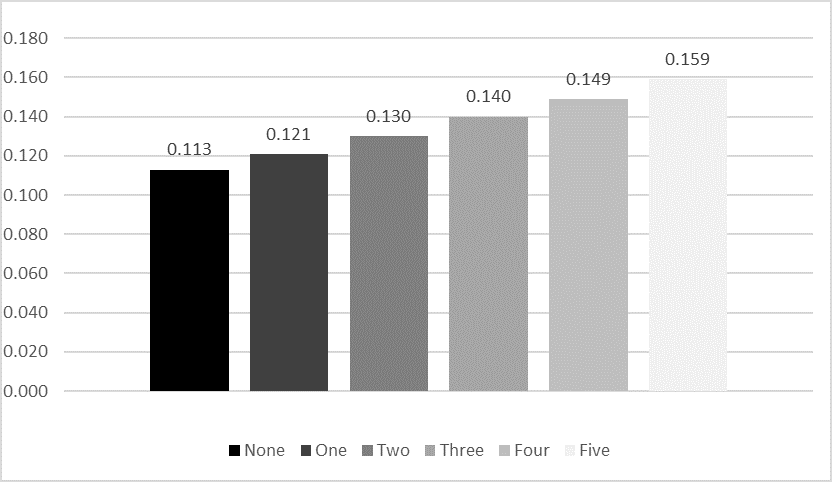
Lindsay J. Benstead
Feelings of insecurity diminish support
Finally, and crucially, human insecurity is a massive barrier to peace. Even if citizens live in a country that is physically free from war, they are constantly exposed to news about conflicts near them. Human insecurity—poverty, the lack of access to food, water and other necessities—and the lack of respect for human rights and the rule of law affect majorities of Arab citizens on a daily basis.
Feelings of insecurity are strongly related to lower support for normalization. The probability of accepting Israel falls from 12.4 percent among those who believe their security is fully ensured to 9.4 percent among those who believe that it is not fully ensured.
This suggests that if US Security assistance and existing international development programs focused on human security are strengthened, they can make a tangible difference in creating conditions to make peacebuilding more likely.
Figure 5. Predicted probability of willingness to recognize Israel at levels of perceived security
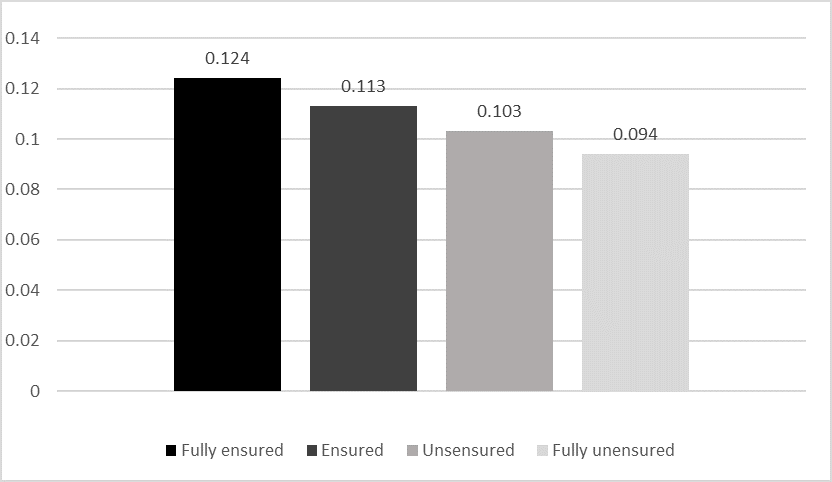
Lindsay J. Benstead
How US assistance may help the Abraham Accords
The survey data show that perceived insecurity undermines citizens’ likelihood of supporting normalization. Yet when civil society flourishes, social trust, and tolerance grow, potentially leading to far-reaching impacts. Global connectivity through social media is also positively associated with more conciliatory views. It is striking that these factors do more to explain greater support for normalization with Israel than age or education level.
This is to say nothing of the Accords’ potential to promote conciliatory views as a result of increased trade and economic integration. There is evidence from Algeria that even among respondents who hold negative views of US culture, positive views of US trade and investment prevent citizens from wanting to take anti-American actions such as boycotting US products.
International development efforts that support civil society organizations can bear fruit, as can those that support global connectivity through equitable access to the Internet and social media. For-profit companies can also play a role in supporting digital inclusion. Security assistance that prevents war and supports reconstruction is also crucially important.
Yet the US must look within and seek to constantly improve the effectiveness of its development efforts and ensure that aid programs align with human rights and brings real economic relief to the poor, not only the wealthy.
Ultimately, to create lasting peace, the US, Israel, and Arab countries must live up to their ideals and place the rule of law and respect for human rights as guiding principles of all their actions. And they must take concrete steps to support Israeli-Palestinian peacemaking. If we do these things, the Abraham Accords and other peacebuilding plans will be more likely to succeed.
The views expressed in these articles are those of the author and do not reflect an official position of the Wilson Center.
About the Author
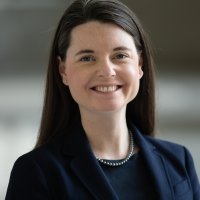
Lindsay Benstead
Associate Professor of Political Science, Mark O. Hatfield School of Government, Portland State University & Director, Middle East Studies Center (MESC), Portland State University

Middle East Program
The Wilson Center’s Middle East Program serves as a crucial resource for the policymaking community and beyond, providing analyses and research that helps inform US foreign policymaking, stimulates public debate, and expands knowledge about issues in the wider Middle East and North Africa (MENA) region. Read more












